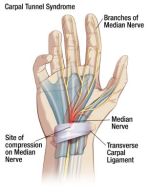- Home
- Diagnosing CTS
- Carpal Tunnel Neck Exam
Carpal tunnel neck exam
A carpal tunnel syndrome neck exam is very important, especially if you are having bilateral carpal tunnel syndrome type symptoms (i.e. symptoms in both hands) because the reason may be that a nerve is being pinched in your neck.
As we've talked about in CTS causes, carpal tunnel anatomy and conditions that can mimic CTS, The median nerve starts out from the neck and eventually branches out into 3 of your fingers and thumb.
Therefore, in order for your doctor or provider to make a carpal tunnel diagnosis, he or she needs to determine if your carpal tunnel symptoms are coming from your neck or just from your wrist area.
Depending on your clinical presentation (i.e.what kind of symptoms of carpal tunnel,or signs of carpal tunnel you are having) Your doctor may feel fairly confident that your carpal tunnel symptoms are originating from your wrist area and forego any kind of carpal tunnel neck exam...at least on your initial visit.
However, if you are 50 or older, and have neck pain or pain in your shoulder blade area and sometimes an ache or pain goes down your arm, along with numbness or tingling feeling down into the hand and fingers...then you NEED to have a complete carpal tunnel exam AND a carpal tunnel neck exam. You need to be worked-up (i.e.evaluated,examined,tests etc...) for a cervical disc problem.
You still may have CTS as well, but your neck needs to be evaluated too!
Your doctor or provider should check your range of motion of your neck (i.e.looking up,down,sideways etc..).He should palpate or feel and press on the muscles and bones of your neck.He should check your arm strength,and grip and reflexes.
You probably will also get some xrays of your neck, looking for arthritis or bone spurs and any break-down or degeneration of your neck bones and discs.
Depending on the severity of your symptoms you may get an MRI, which is a special type of xray in where soft tissues and discs show up better than xrays.It can show a ruptured disc (herniated disc) about 90-95% of the time.
There are several special exams that may be performed on your neck to help diagnose your carpal tunnel symptoms.
I will go over two of the more common ones:
1. The spurlings test
Also known as a neck compression test, the result is positive if pain radiates or goes into the arm toward which the head is side flexed (or bent to the side) during compression (the examiner is pushing down on your head). IF positive this indicates pressure on a nerve root at the neck.
2. The distraction test
This is where the examiner places hands on both sides of your head and slowly lifts your head up, like you are going to have your neck stretched!...This test is positive if the pain is relieved or decreased when the head is lifted,indicating that the pressure on the nerve root is being relieved.
Finally,if your having symptoms of neck pain,numbness and tingling going down the arm,that has been going on a while or getting worse,then your provider may order a carpal tunnel test called EMG/ NCS tests of your arms.These two different carpal tunnel tests can help determine what nerves are involved and if there is any nerve damage present.
Hopefully you can now see why a carpal tunnel exam is important and why some cases of carpal tunnel syndrome can be difficult to diagnose if you are also having neck and arm symptoms.
CTS Explanation
CTS surgery
Non-surgical treatments
CTS wrist braces
Carpal tunnel syndrome cure?
Medicines for carpal tunnel relief
Conditions that mimic CTS
- Home
- Diagnosing CTS
- Carpal Tunnel Neck Exam
Share this page:
Recent Articles
-
The carpal tunnel store
The carpal tunnel store has a huge selection of Medical Grade Products -
Anatomy of the carpal tunnel
The carpal tunnel anatomy is easy to understand if you remember we're dealing with a tunnel of sorts in your wrist. Learn the anatomy from a medical practitioner. -
Carpal tunnel prevention program
A carpal tunnel prevention program at the workplace may help employees from getting symptoms. Learn the best carpal tunnel prevention program on the web today.
Recent Articles
-
The carpal tunnel store
The carpal tunnel store has a huge selection of Medical Grade Products -
Anatomy of the carpal tunnel
The carpal tunnel anatomy is easy to understand if you remember we're dealing with a tunnel of sorts in your wrist. Learn the anatomy from a medical practitioner. -
Carpal tunnel prevention program
A carpal tunnel prevention program at the workplace may help employees from getting symptoms. Learn the best carpal tunnel prevention program on the web today.
